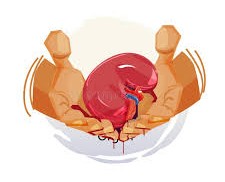Protecting the Gift of Life: How to Prevent Organ Rejection After Kidney Transplant


What is Organ Rejection and Why Does It Happen?
When someone receives a kidney transplant, the body’s immune system sometimes reacts by attacking the new organ. This happens because the immune system is designed to defend the body from anything it sees as foreign, such as bacteria or viruses. Unfortunately, it cannot always tell that the new kidney is meant to help. The immune system identifies certain proteins on the kidney’s cells as different and starts to attack them. This process can harm or even destroy the transplanted kidney if not controlled.
Key thoughts:
- The immune system’s natural defense mechanism mistakenly targets the new kidney.
- Donor and recipient tissues can differ, even with a close match.
- Without proper medical care, rejection can develop quickly and damage the organ.
Understanding this process helps doctors choose the best treatment plan to stop the immune attack. Awareness of how rejection begins is the first step toward protecting a new kidney.
How Can Patients Lower the Risk of Organ Rejection?
The good news is that organ rejection can often be prevented with care and discipline. After a kidney transplant, patients receive detailed instructions from their transplant team to help them maintain the new organ. The success of the transplant depends greatly on how well patients follow this plan. Missing doses or skipping appointments can increase the risk of rejection.
Key thoughts:
- Always take prescribed medicines exactly as instructed.
- Keep all follow-up visits and communicate openly with the transplant team.
- Eat a balanced diet and avoid foods that interfere with medication absorption.
- Watch for symptoms like swelling, reduced urination, or fever.
Prevention begins with responsibility and routine. Staying consistent with treatment builds a shield against rejection.
The Role of Immune System Control
After a transplant, the body’s defense system must be carefully balanced. Medicines called immune-suppressing agents help prevent the immune system from attacking the new organ, while still allowing it to fight normal infections. These medicines are essential for long-term kidney survival and must be taken exactly as prescribed.
Key thoughts:
- These drugs reduce the immune system’s strength just enough to protect the kidney.
- Regular blood tests check medicine levels to ensure safety and effectiveness.
- Sudden changes in dosage or missed doses can cause rejection episodes.
By balancing the immune system, doctors protect both the organ and the patient’s overall health. Controlled immunity is the key to a lasting and healthy transplant.
Importance of Lifestyle and Monitoring
Living a healthy life after a transplant is not only about medicine—it is also about smart choices and regular checkups. A well-balanced lifestyle helps prevent complications and supports the kidney’s function. Patients must stay alert to any signs of trouble and maintain close contact with their healthcare team.
Key thoughts:
- Drink fluids as recommended, but avoid overhydration.
- Stop smoking and limit alcohol to prevent damage to the new kidney.
- Stay active with gentle exercise to support circulation and energy.
- Keep track of blood pressure, weight, and lab results.
Healthy routines combined with monitoring ensure that the new kidney continues to function properly. Every healthy choice adds years to the life of the transplant.
What Happens if the Body Still Shows Signs of Rejection?
Even with careful prevention, mild rejection can still happen. The key is to identify it early and act quickly. Doctors monitor blood tests, urine output, and physical symptoms to detect early warning signs. Most rejection episodes can be managed if treated right away.
Key thoughts:
- Swelling, pain, fever, or a decrease in urine can indicate early rejection.
- Blood test changes may show a rise in kidney function markers.
- Doctors may adjust or switch medicines to control immune activity.
Timely detection and treatment can save the kidney and restore its function.Quick action and strong medical guidance make recovery possible.
How Rapacan (Sirolimus) Helps in Preventing Rejection
Rapacan, known by its generic name Sirolimus, is an important medicine used to prevent kidney transplant rejection. It works by blocking specific signals that tell immune cells to multiply and attack the transplanted organ. This unique approach makes it valuable in patients who need long-term protection or cannot tolerate other drugs.
Key thoughts:
- Rapacan slows down immune cell activity that causes rejection.
- It is usually taken once daily, and doctors monitor blood levels regularly.
- The medicine can be combined with other agents for better results.
With the guidance of healthcare specialists, Rapacan provides stable protection for kidney transplant recipients. Sirolimus offers a targeted and reliable defense for the transplanted organ.
The Benefits and Safety of Rapacan in Kidney Transplant Patients
Rapacan has become a trusted option for many transplant patients worldwide. It is known for helping maintain organ function with fewer long-term side effects compared to some older medications. Patients using Sirolimus often report stable kidney function and fewer complications related to immune control.
Key thoughts:
- It may allow lower doses of other stronger immune medicines.
- Regular checkups ensure correct blood levels and safety.
- Patients experience steady kidney health when following medical guidance.
Through consistent use, Rapacan helps patients achieve a balanced and healthy post-transplant life. Sirolimus empowers patients to live confidently with their new kidney.
Living Well After Kidney Transplant
Life after a kidney transplant is a journey of care, gratitude, and responsibility. The combination of effective medication, healthy habits, and regular medical support can ensure many active and fulfilling years. Each patient plays a central role in protecting their new kidney by following medical advice and living mindfully.
Key thoughts:
- Follow medicine schedules precisely and never skip doses.
- Keep regular contact with your doctor and share any new symptoms quickly.
- Maintain a positive outlook and manage stress, which supports healing.
Long-term success is not only medical—it is emotional, physical, and personal. Life with a kidney transplant can be full, healthy, and rewarding with the right care.
Drug Description Sources: U.S. National Library of Medicine, Drugs.com, WebMD, Mayo Clinic, RxList
Reviewed and Referenced By:
- Dr. Laura Mitchell – Nephrologist and Kidney Transplant Specialist
- Dr. Peter Collins – Immunology and Organ Transplantation Research Expert
- Dr. Sarah Thompson – Clinical Pharmacologist, Sirolimus Research Advisor
- Dr. Daniel Rivera – Medical Reviewer, WebMD and RxList contributor
- Dr. Emily Novak – Transplant Medicine Consultant, Mayo Clinic Collaborator
Article Post: Editorial Team of RXShop.md
(Updated at Oct 18 / 2025)

